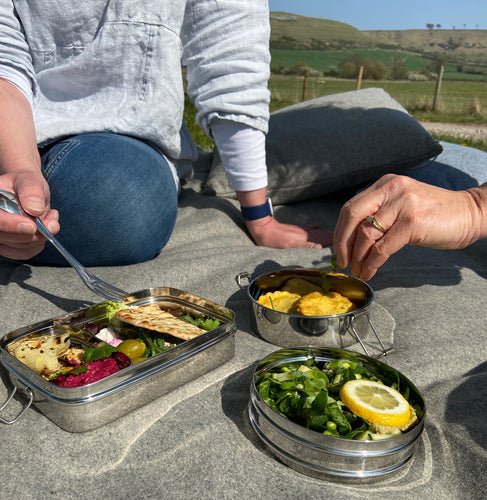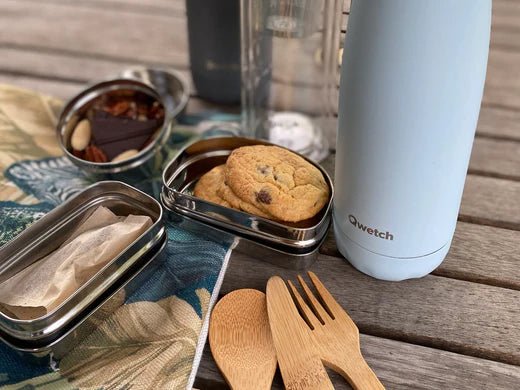Our Eco Values: Organic

Our organic collection reflects our commitment to respect our planet, our environment and all the people, plants and animals that live throughout our world.
What Does Organic mean?
Organic agriculture is about a way of farming that pays close attention to nature by using fewer chemicals on the land such as artificial fertilisers, it means more wildlife and biodiversity, and the avoidance of genetic modification. Organic farms are dedicated to sustaining the health of soils, ecosystems and people, working within nature’s cycles and producing food and other products in ways that do not harm the environment.
Unlike the natural labels that you might see on many products, organic is a protected term, subject to legal regulation.
For a food or drink product to be labelled as organic, at least 95 percent of the ingredients must come from organically produced plants or animals, these ingredients must be approved by an independent certification body. For cotton and other materials Global Organic Textile Standard (GOTS) states an item can be labelled organic if 95% of the fabric is organically grown.
However, the use of the term organic is unregulated for beauty and wellbeing products. With some companies claiming a product is 'organic' with only 1% organic ingredients! Unless a product is certified, there’s no guarantee that it will be 100 percent organic. So, look for a symbol from an independent certifier, like Soil Association Certification. You'll then know that every step of the production process is checked. Our organic toiletries collection only includes 100% organic ingredients or a very high proportion of organic ingredients.
Who regulates and certifies that a product is organic?

- The Soil Association Certification body is considered the UK's leading organic certification body, certifying over 70% of the organic market.
- The Irish Organic Association (IOA) is Ireland's leading organic certification body.
- USDA Organic regulates organic certification in the USA.
- In the textiles industry Global Organic Textile Standard (GOTS) and Global Organic Latex Standard – (GOLS) are both global standards.
Why is Organic better for you?

Making a choice to buy organic means choosing products that are safer for you and your family. For example, many of our baby and wellbeing products are made with organic cotton, rubber or wood. Organic means after growing and harvesting the main crop, no toxic products, glues or chemicals are added in manufacturing the product. This is so important for reducing exposure to these potentially harmful elements, particularly with young babies chewing everything and on their delicate skin.
Coffee, tea and chocolate are some of the most heavily chemically treated crops in the world. Organic means being sure that you are buying these items with zero pesticide residue.
Our skin is our largest organ and skincare ingredients can be absorbed through the skin and enter the body, a process called dermal absorption. Choosing organic skincare products mean they contain ingredients that are grown on organic farms without the use of artificial substances, they cannot contain chemical fertilizers, pesticides, antibiotics, hormones, parabens, sulphates, and GMOs.
Why is organic better for the planet?
There are multiple benefits of organic farming for the planet:
1. Organic farms use less energy, and tend to have lower emissions:
On average, organic farms use less energy than non-organic farms. This is because organic standards encourage farmers to ‘close the loop’, making use of what’s to hand and limiting the use of imported resources. It’s this respect for the natural world and ability to work with nature that makes organic farming better for the planet:
• Organic farming reduces greenhouse gas emissions by severely restricting the use of manufactured chemical fertilisers, which are often imported from abroad and come from burning fossil fuels. Instead, farmers rely on natural fertilisers, which can be sourced locally or from their own farm like green manures, animal manures and ‘cover crops’ to fix nutrients, as well as crop rotations.
• Soil Association organic standards severely restrict the use of peat in composts. Peat comes from peatlands and peat bogs – they are an important carbon sink and a valuable part of our ecosystem, which are vital for combatting climate change.
• GM animal feed is banned under organic standards. Most non-organic British chickens, pigs and cows are fed with GM crops, like maize and soya, which are imported from abroad. Organic cows must be fed a minimum of 60% grass-based diet, rather than other feeds like cereals and soya, which are often imported.

2. Organic farming reduces nitrogen pollution:
Nitrogen is an element essential for all life on earth and vital in food and farming. But, when used in excess, nitrogen becomes a dangerous pollutant of our air, rivers, soils and seas.
The creation of artificial fertilisers consumes 3-5% of all global natural gas; this fossil fuel-reliant system has been a quick fix for producing more food but has come at a huge cost to nature, climate and human health.
How is organic different?
• Banning the use of synthetic nitrogen fertilisers in organic systems lowers the risk of environmental pollution from farming. Nitrogen fertilisers can create ‘ocean dead zones’ which deprive life below water of vital oxygen.
• In addition, healthy soils protect underground water supplies, by neutralising or filtering out potential pollutants. Increasing soil organic matter levels through organic farming methods, like composting and manure can improve this function.
3. Organic soils store more carbon:

Did you know that our soils store more carbon than the atmosphere, and all of the world’s plants and forests combined? Healthy soils are one of our most important weapons in the fight against climate change.
Healthy soils ‘sequester’, or store carbon dioxide from the atmosphere, drawing it down through photosynthesizing organisms like trees and plants, and storing it as ‘soil organic carbon’.
Organic farming is based on taking care of the soil, nourishing the soil with composts, manure and regular rotations, and keeping it covered with different crops throughout the year. This helps build 'soil organic carbon', and as a result, long term studies have shown comparing organic and conventional farming systems that soils in organic farms store more carbon.
Our Organic Products and Materials
-
Organic Bamboo

- Organic Cotton
Organic cotton is cotton that is grown without the use of synthetic chemicals, such as pesticides or fertilizers, or genetically modified (GMO) seeds. It is also grown in ways that work with nature, rather than against it, and can be more sustainable and eco-friendly than conventional cotton.
Organic cotton has many advantages over conventional cotton, including:

• Healthier for the land: Organic farming systems can promote the health of soils and ecosystems by relying on ecological processes and biodiversity.
• Healthier for farmers and their communities: Organic certification sets strict social and economic conditions for farmers and buyers, which can help reduce poverty, protect against child labour, and ensure safe working conditions and fair wages.
• Cleaner water: Organic farming bans dangerous pesticides and fertilizers, which can help keep drinking water, lakes, and rivers cleaner.
• Less water: Organic cotton requires less water to grow than regular cotton.
• Handpicked: Organic cotton is handpicked rather than machine-picked, which can damage the fibres.

We stock a range of baby clothes, blankets, towels, baby toys and accessories from well established, certified organic brands such as Pigeon Organics, Mori, Kite, Trixie Baby and Pebble. All of these gorgeous baby items are organic, thoughtfully designed and safe for your baby and young children.
Our organic wellbeing range from A Slice Of Green is made from GOTS certified organic cotton stitched with polycotton thread for strength and durability.
The Global Organic Textile Standard (GOTS) is the worldwide leading textile processing standard for organic fibres and means the entire textile supply chain is independently certificated including both ecological and social criteria. The cotton is grown on non GM, small farms in South India where the dry climate helps the cotton to grow well. It is then woven in GOTS certified weaving units and made into useful, reusable products, encouraging a more sustainable lifestyle with less waste.
- Organic Rubber
Our Tikiri baby teethers are handmade in Sri Lanka from 100% pure organic rubber with GOLS (Global Organic Latex Standard) accreditation. They are then hand painted using water based non-toxic dyes and pigments. The latex is ethically sourced directly through a small, family run plantation that uses traditional methods to extract it from the Havea trees - a process called tapping. It’s a slow process and must be done by a skilled hand in an environmentally friendly way so the trees remain in good health. The trees release the latex which slowly drips into a holding cup. This process takes around 6 hours. In addition to taking good care of the trees - no chemicals or preservatives are added to the latex to ensure that the material remains as pure as possible. The purchase of rubber toys in place of plastic is a great eco friendly choice. Not only is rubber natural and non-toxic, it is also kinder on the planet as it can take around 50 years to break down as opposed to thousands with plastic, if ever at all! Rubber can also be recycled and made into something else of use such as matting and sports turf etc.
- Organic Toiletries
- Organic Chocolate and Tea
 Organic certification in the food and drink industry states that for a food or drink product to be labelled as organic, at least 95 percent of the ingredients must come from organically produced plants or animals, these ingredients must be approved by an independent certification body. Our organic chocolate selection from brand Ocelot is certified organic by Organic Farmers & Growers (OF & G) and Organic Agriculture Europe.
Organic certification in the food and drink industry states that for a food or drink product to be labelled as organic, at least 95 percent of the ingredients must come from organically produced plants or animals, these ingredients must be approved by an independent certification body. Our organic chocolate selection from brand Ocelot is certified organic by Organic Farmers & Growers (OF & G) and Organic Agriculture Europe.
Organic chocolate contains organic cocoa beans, which are grown without synthetic pesticides in an all-natural environment, they contain more flavonoids, which are antioxidants that may help protect health, Organic chocolate may also contain fewer artificial ingredients, like sweeteners, dyes, and wax.
Organic tea farming practices, like crop rotation, are more sustainable than mass tea production. Organic farming also helps maintain biodiversity, which is important for the food system. Healthy soils can also store more carbon, which can help slow global warming. Organic tea has a reduced environmental impact as organic farmers can only use a limited number of natural pesticides, like citronella and clove oil, under strict circumstances. This helps protect insects and reduces the amount of pesticides that enter the water system.

Conclusion
The Soil Association state that 'There is a climate emergency - we have less than ten years to change our behaviour to prevent catastrophic global heating. However, the way we eat and farm can make a world of difference.'
Organic farming respects the natural systems of pest and disease in the cultivation of crops and livestock and avoids the use of synthetic pesticides, herbicides, chemical fertilisers, growth hormones, antibiotics and genetic engineering. Instead organic farmers use a variety of techniques that help to preserve ecosystems and reduce pollution. Biodiversity is increased on organic farms, for instance there are approximately 44% more birds on organic fields.
Buying organic products is also better for our health, reducing our exposure to toxic chemicals and this is particularly important for babies and young children.
Choose from our Organic Collection at Green Tulip, secure in the knowledge that we have thoroughly assessed any claims and checked certifications of our products.




